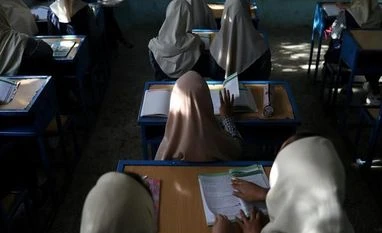UN to declare gender apartheid as mental health of Afghan women worsens
The Taliban took power in August 2021 during the final weeks of the US and NATO forces' pullout from Afghanistan after 20 years of war
)
We ask you to lend your full support to an intergovernmental process to explicitly codify gender apartheid in international law, Bahous urged the 15-member council including its five permanent members: the United States, Russia, China, Britain and France | (Photo: ANI)
The UN's most powerful body must support governments seeking to legally declare the intensifying crackdown by Afghanistan's Taliban rulers on women and girls gender apartheid, the head of the UN agency promoting gender equality said Tuesday.
Sima Bahous, executive director of UN Women, told the Security Council that more than 50 increasingly dire Taliban edicts are being enforced with more severity including by male family members. That is exacerbating mental health issues and suicidal thoughts especially among young women and is shrinking women's decision-making even in their own homes.
They tell us that they are prisoners living in darkness, confined to their homes without hope or future," she said.
Under international law, apartheid is defined as a system of legalized racial segregation that originated in South Africa. But a growing consensus among international experts, officials and activists says apartheid can also apply to gender in cases like that of Afghanistan, where women and girls face systematic discrimination.
We ask you to lend your full support to an intergovernmental process to explicitly codify gender apartheid in international law, Bahous urged the 15-member council including its five permanent members: the United States, Russia, China, Britain and France.
Also Read
There is no existing international law to respond to "mass, state-sponsored gender oppression, Bahous said. But she said the Taliban's systemic and planned assault on women's rights must be named, defined and proscribed in our global norms so that we can respond appropriately.
The Taliban took power in August 2021 during the final weeks of the US and Nato forces' pullout from Afghanistan after 20 years of war. As they did during their previous rule of Afghanistan from 1996 to 2001, the Taliban gradually reimposed their harsh interpretation of Islamic law, or Sharia, barring girls from school beyond the sixth grade and women from almost all jobs, public spaces, gyms and recently closing beauty salons.
The Security Council meeting on UN Secretary-General Antonio Guterres' latest report on Afghanistan took place on the final day of the annual meeting of world leaders at the 193-member UN General Assembly.
No country has recognized the Taliban, and the assembly's credentials committee hasn't either, primarily over its effort to relegate women to their homes and failure to form an inclusive government. This has left UN recognition with the now-ousted previous government led by Ashraf Ghani. For the third year, its representative did not speak at the high-level gathering.
Bahous said that over the past year, UN Women collaborated with the U,N. political mission in Afghanistan known as UNAMA and the UN International Office for Migration to interview over 500 Afghan women.
Among their key findings, she said:
46 per cent think the Taliban should not be recognized under any circumstances;
50 per cent think the Taliban should only be recognized after it restores women's and girls' rights to education, employment, and participation in government.
The women interviewed said the dramatic shrinking of their influence on decision-making, not just at the national or provincial level but also in their communities and homes, is driven by increased poverty, decreasing financial contribution and the Taliban's imposition of hyper-patriarchal gender norms, Bahous said.
In a grim sign of women's growing isolation, she said, only 22 per cent of the women interviewed reported meeting with women outside their immediate family at least once a week, and a majority reported worsened relations with other members of their family and community.
Bahous said the restrictions on women have led to an increase in child marriage and child labor, and an increase in mental health issues.
As the percentage of women employed continues to drop, 90 per cent of young women respondents report bad or very bad mental health, and suicide and suicidal ideation is everywhere, she said.
Roza Otunbayeva, the UN special envoy for Afghanistan and head of UNAMA, welcomed the recent visit of a group of Islamic scholars from the Organization of Islamic Cooperation's member nations to Afghanistan to focus on girls' education, women's rights and the need for inclusive governance.
The scholars stressed that these requirements are integral to Islamic governance around the world, she said. We urge that these visits continue. They are part of a vital conversation between the de facto authorities and the international community helpfully mediated by the Islamic world.
(Only the headline and picture of this report may have been reworked by the Business Standard staff; the rest of the content is auto-generated from a syndicated feed.)
More From This Section
Don't miss the most important news and views of the day. Get them on our Telegram channel
First Published: Sep 27 2023 | 7:26 AM IST


